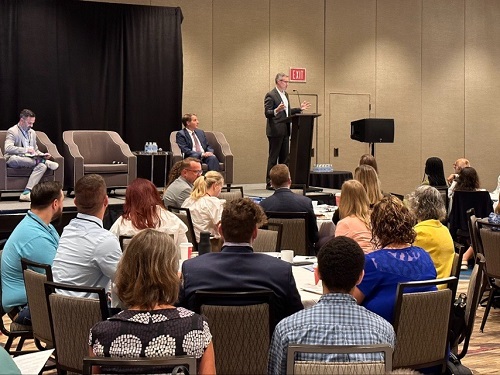The American Association of State Highway and Transportation Officials, the National Association of State Energy Officials, and the U.S. Joint Office of Energy and Transportation hosted a conference last week in Arlington, VA, that served as a platform for helping states build out a national electric vehicle or EV charging network that is “convenient, reliable, affordable, accessible, and equitable.”
[Above photo by AASHTO]
Jim Tymon (above at podium), AASHTO’s executive director, noted in his opening remarks that the conference aimed to “delve into many of the pressing issues” state departments of transportation and other state agencies have regarding the development and deployment of EV charging infrastructure, such as electrical grid capacity, charger reliability, equity, and stakeholder engagement.
“We are at a critical juncture in the future of transportation,” Tymon said. “The role of state DOTs and [state] energy offices is rapidly evolving, marked by technological advancements, shifting demographics, and pressing environmental concerns. In the face of this transformation, we possess a collective opportunity to overcome challenges and meet the goals and objectives set before us.”
The conference also served as a way for state DOTs to exchange ideas, foster collaborations, and explore innovative solutions as they deploy their National Electric Vehicle Infrastructure or NEVI plans, which were all formally approved by the Federal Highway Administration in September 2022.
Speakers at multiple sessions during the July 13-14 event included state DOT and state energy office personnel as well as industry and market experts, alongside experts from the FHWA, U.S. Department of Energy, Council on Environmental Quality, and National Park Service.
Key sessions at the conference touched on EV deployment, especially on ways public utility commissions and electric utility companies could consider developing “EV specific energy rates” to avoid high demand charges and barriers to adoption; EV charger reliability and ways to improve the charging experience for EV users; and how states can achieve key Justice40 goals through the NEVI program and beyond.



